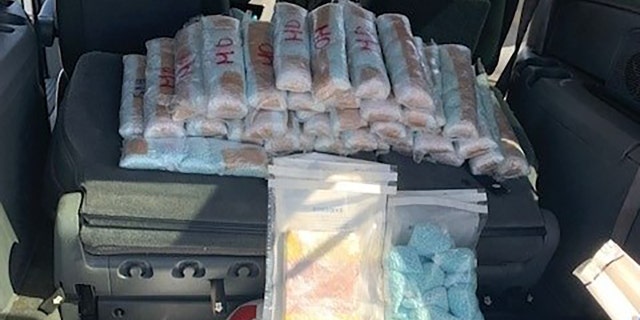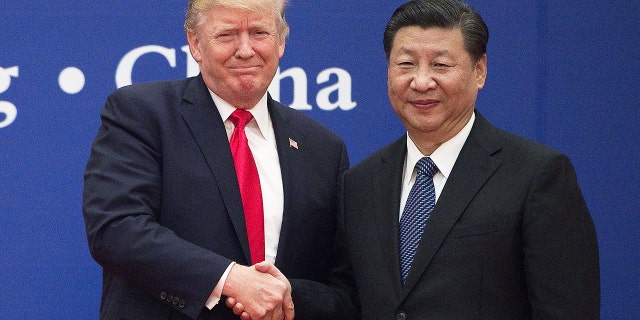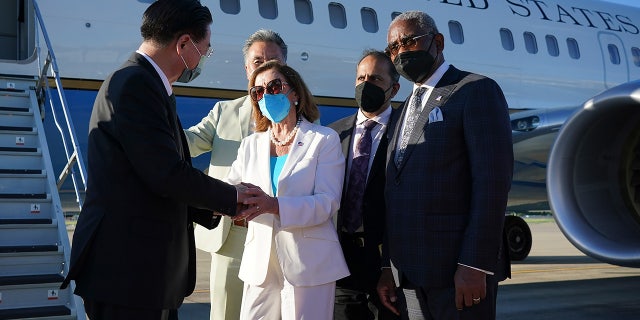NEWYou can now listen to Fox News articles!
Large Chinese drug networks are helping fuel the U.S. fentanyl crisis, a situation Beijing has little incentive to combat amid deteriorating relations with Washington.
“Since approximately 2013, China has been the principal source of the fentanyl flooding America’s illicit drug market,” Craig Singleton, a senior fellow at the nonpartisan Foundation for Defense of Democracies, told Fox News Digital.
Singleton’s assessment of the issue is shared by the U.S. government, with a 2020 Drug Enforcement Administration report finding that China is the main source of fentanyl and fentanyl-related substances trafficked to the U.S., while also being the largest source of trafficking through “international mail and express consignment.”
Seizures of fentanyl from China are often less than one kilogram in weight, but test above 90 percent concentration for pure fentanyl.
FLORIDA POLICE UNIT SEIZES ENOUGH FENTANYL TO KILL 1.5 MILLION ADULTS
Chinese President Xi Jinping.
(Photo by Li Xueren/Xinhua via Getty Images)
According to a 2020 NPR report, Chinese drug cartels have leveraged the internet to market fentanyl and chemicals used to make fentanyl, often selling and shipping the drugs directly to U.S. customers. Mexican drug cartels have also been large consumers of the Chinese drug trade, taking in shipments from China before smuggling the drugs across the U.S. border.
After years of pressure, the Chinese government took action on the issue in 2019 by more heavily regulating fentanyl production in the country. As part of a deal agreed to with the Trump administration, the Chinese government committed to investigating known fentanyl manufacturing areas, to enact strict controls over internet marketing of the drug, and stricter measures on enforcing drug shipping regulations.
“The Obama and Trump administrations devoted significant diplomatic capital to persuading Beijing to crack down on the supply of fentanyl from China to the United States. In April 2019, China finally announced that the production, sale, and export of all fentanyl-class drugs would be prohibited, except by authorized firms which the Chinese government has granted special licenses,” Singleton said.

56 pounds of fentanyl estimated to be worth $3.6 million.
(Nevada State Police )
The measures resulted in a significant reduction of China’s illicit fentanyl trade, with the DEA expressing hope that the country would soon lose its status as the leading supplier of the drug to the U.S.
But powerful Chinese drug networks have found creative ways to circumvent the restrictions, camouflaging their efforts with complex networks originating in isolated interior cities and developing sophisticated new shipping methods designed to evade law enforcement detection.
Chinese drug networks have also worked around the restrictions by producing and selling chemicals used to make fentanyl, making the enforcement more difficult.

US President Donald Trump and China’s President Xi Jinping shake hands.
(NICOLAS ASFOURI/AFP/Getty Images)
SEN. MARSHALL BLASTS CDC FOR NOT DECLARING EMERGENCY OVER FENTANYL: ‘WHAT ARE WE DOING?’
“Many Chinese networks involved in the production and advertising of fentanyl quickly adapted to increased legal constraints by modifying their techniques to exploit loopholes in chemical restrictions and disguise their activities,” Center for Advanced Defense Studies analyst Michael Lohmuller told NPR a year after the restrictions were put in place.
The souring of relations between the U.S. and China now threatens to undo much of the progress since 2019, most notably after House Speaker Nancy Pelosi’s trip to Taiwan enraged the Chinese government.
“This summer, following U.S. House Speaker Nancy Pelosi’s travel to Taiwan, the Chinese government suspended collaboration with Washington on transnational crime and illegal drug issues,” Singleton said. “An expected deterioration of U.S.-China relations will likely further undermine Beijing’s willingness to enforce its own 2019 fentanyl regulations, which could lead to a worsening of the U.S. drug epidemic and associated trafficking activities.”

Taiwan’s Foreign Minister Joseph Wu, left, speaks with U.S. House Speaker Nancy Pelosi as she prepares to leave in Taipei, Taiwan, Wednesday, Aug. 3, 2022.
((Taiwan Ministry of Foreign Affairs via AP))
CLICK HERE TO GET THE FOX NEWS APP
Singleton argued that the Chinese government likely has little incentive to begin strict enforcement again, noting that the U.S. is at the center of the opioid crisis and not China. That reality means trafficking from China may only increase in the near future.
“Going forward, it seems likely that we will see an increase in illicit Chinese drug and human trafficking flows into the United States, which will further strain Customs and Border Patrol resources,” Singleton said.
In the wake of China’s decision to stop working with the U.S., Singleton highlighted the need for an assessment of the move’s ramifications.
“One thing that is urgently needed is an unclassified assessment, ideally one produced by the Department of Homeland Security, regarding the potential ramifications stemming from China’s decision to terminate joint collaboration on transnational crime and fentanyl-related issues,” Singleton said. “This is also an area where much stronger Congressional oversight is needed, particularly by the relevant Congressional committees responsible for homeland security-related matters.”